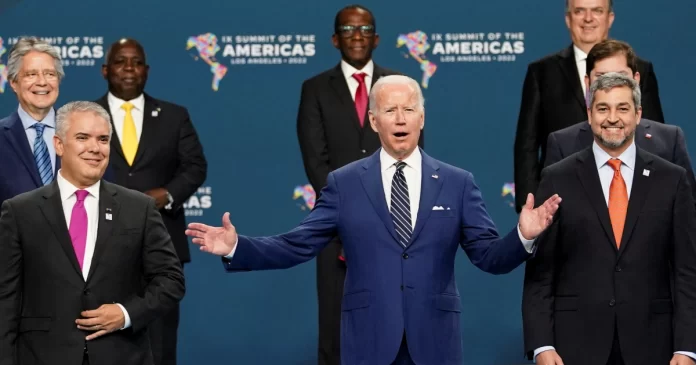President Biden still has an opportunity to restore trust with his southern neighbours after the Summit of the Americas.
Last week, Los Angeles hosted the Summit of the Americas amid a thorny period between the governments of the region. While long-running tensions over which countries were invited to attend risked overshadowing the event, the summit was a unique opportunity for Latin American leaders to come together and for President Joe Biden to mend relations with them.
The crisis induced by the COVID-19 pandemic has devastated Latin America. We as a region have not been able to measure, understand and prevent the loss of human life, but it is estimated that Latin America has one of the highest mortality rates in the world. By putting the impact of the pandemic front and centre our governments can exercise the leadership our citizens need today in a region that is already the most unequal in the world.
As pharmaceutical companies have prioritised selling doses where they can secure the highest profits and without a shared approach to advance the interests of the region as a whole, accessing COVID-19 vaccines has been an uphill struggle for the continent. As a result, more than 200 million people remain unvaccinated across the region.
A combination of large urban populations, heavy chronic disease burden, weak health systems, and a seriously unequal global vaccine rollout has led some experts to warn that Latin America could be the most vulnerable region in the world to the emergence of a new variant. This is not just a Latin American problem, but a problem for everyone.
- Covid tests for airtravelers in the US will be droppped soon.
- COVID origins: WHO ‘open to any and all scientific evidence’.
With nearly all Latin American governments supporting exemption from intellectual property rules on COVID-19 vaccines, tests and treatments; and considering that some countries in the region have the capacity to manufacture vaccines and modern treatments – US government support for easing patent protection for vaccines, antiviral treatments and life-saving tests could be a game-changer.
The delayed World Trade Organization (WTO) negotiations, currently bogged down with proposals that are actually worse than the status quo when it comes to access to medicine, have led countries to seek their own solutions. Countries like Brazil proposed a bill to bypass intellectual property rules, but those efforts too have stalled. Over two years since the appearance of the coronavirus, there is a fear of repeating the same mistakes of the past. We are not cooperating as a region; we are letting the profits of US companies take control.
The behaviour of US pharmaceutical giants has not earned goodwill in the region. Sweeping demands were made of governments and aid programmes in return for supplying desperately needed materials.
Now that lifesaving oral antiviral treatments for COVID-19 have been developed, the World Health Organization (WHO) has warned that the world is repeating the mistakes made in the first stages of the pandemic. Rich countries are quickly buying the world’s initial supply of these treatments, while low- and middle-income nations are unlikely to see any before 2023.
Contracts remain shrouded in secrecy. UNICEF allegedly had to agree to not disclose how much it had paid Pfizer to access doses of anti-viral treatment Paxlovid. And the company has been publicly condemned by the WHO for a “lack of transparency”.
After overwhelming pressure from global health activists, Pfizer and Merck have partnered with the Medicines Patent Pool to license their antiviral COVID-19 pills to lower-income countries. But the licences issued exclude nearly all of Latin America, as does Pfizer’s recent pledge to sell a slew of drugs at a “nonprofit” price. To ensure truly equal access, American pharmaceutical companies must step up.
At the Global COVID-19 summit in May, Biden committed to sharing a number of publicly-owned coronavirus technologies with WHO to support generic manufacturing efforts around the world. This was an important statement of his administration’s intent to address the structural barriers to equitable medical access. This is a step in the right direction. Now, governments must take the next step.
That requires agreeing on a unified position that benefits the region and standing up to the pharmaceutical giants that have repeatedly put their own profits before the needs of public health.
With support from his peers, Biden must bring Pfizer, Moderna, and Merck to follow in his government’s footsteps and share their COVID-19 technologies with the world. And he can join the many Latin American governments at the WTO in supporting a full and comprehensive waiver of all intellectual property rules relating to coronavirus vaccines, tests, and treatments.
This summit has been billed as an opportunity to build a future that is “sustainable, resilient, and equitable”. The effect of COVID-19 in Latin America remains a threat to each of those goals.
As the UN Committee on the Elimination of Racial Discrimination said, the global pandemic response has shown further evidence of racism in a “system privileging those former colonial powers to the detriment of formerly colonised states”. By taking firm action on COVID-19 equity, our governments can make a long-overdue dent in that system.
For too long, Latin America has been treated as a second-class actor in global geopolitics, and the problems that affect people’s everyday lives have not been effectively addressed for too long. The global response to COVID-19 has only exacerbated this reality. And better cooperation between governments in the region is an essential step to make things right.
For his part, President Biden has the opportunity to restore trust with his southern neighbours after the Summit of the Americas. But this will require concrete acts of solidarity, responsible leadership and objective measures that guarantee the region’s progress towards equitable access to technologies developed by science to face COVID-19 and other future pandemics.





